Creech AFB to raze casino over security concerns
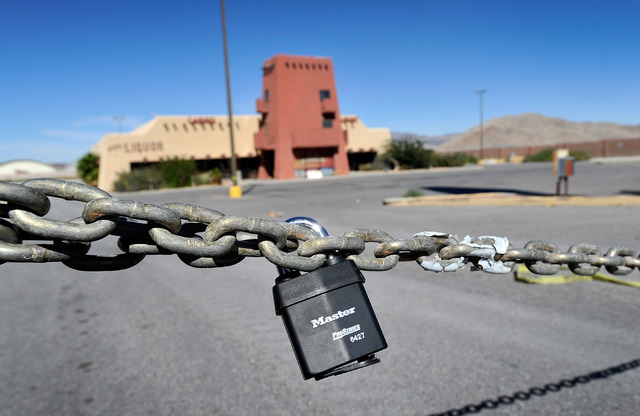
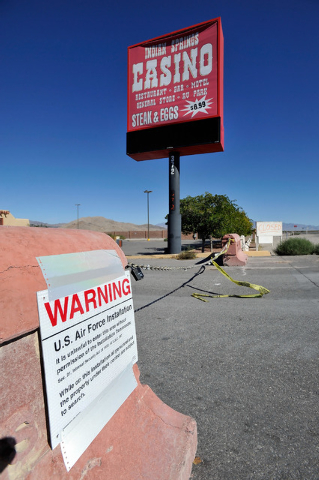

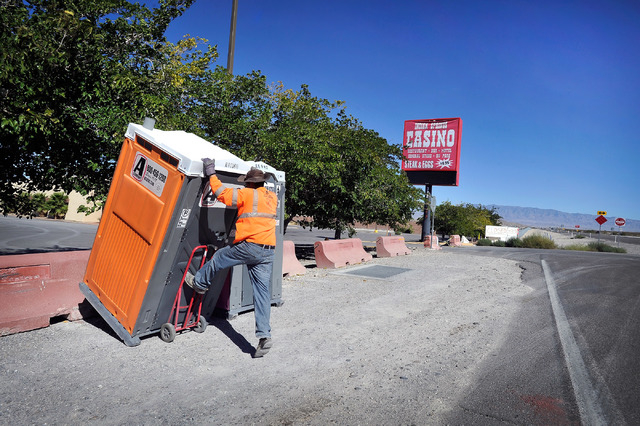
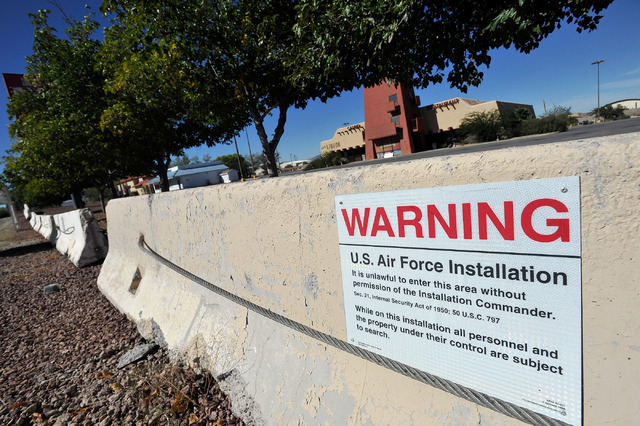
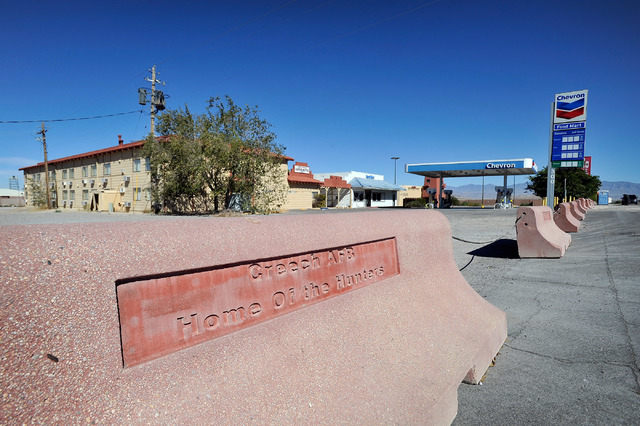
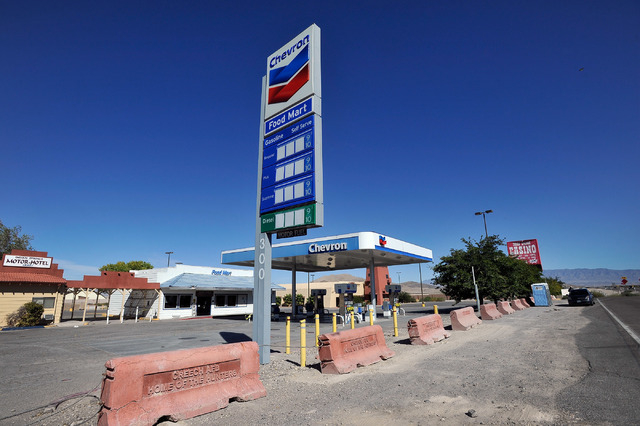
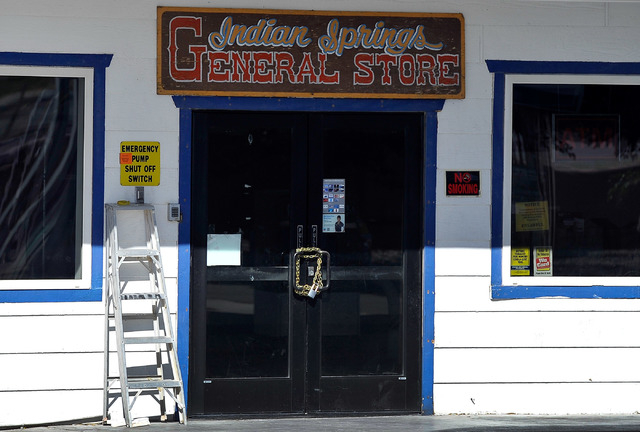
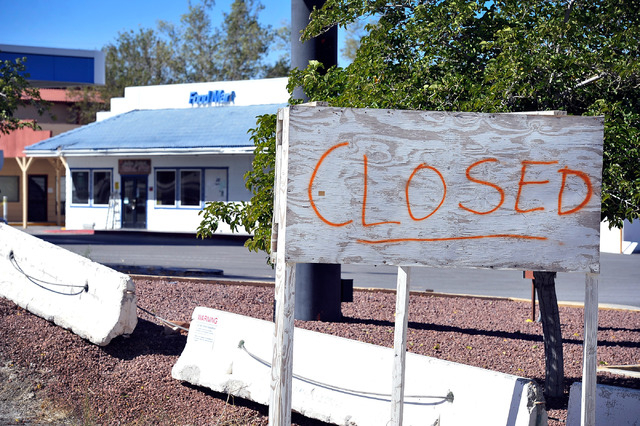


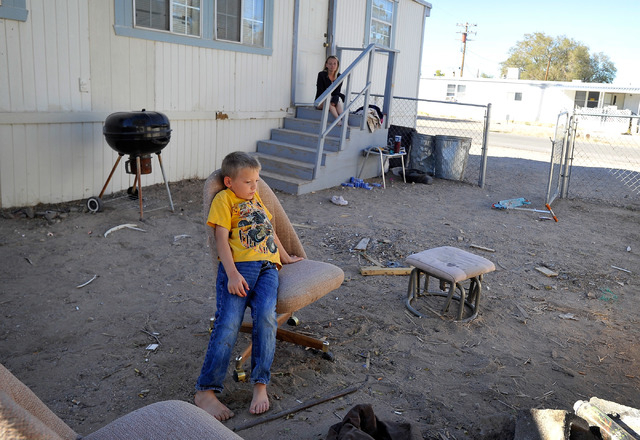
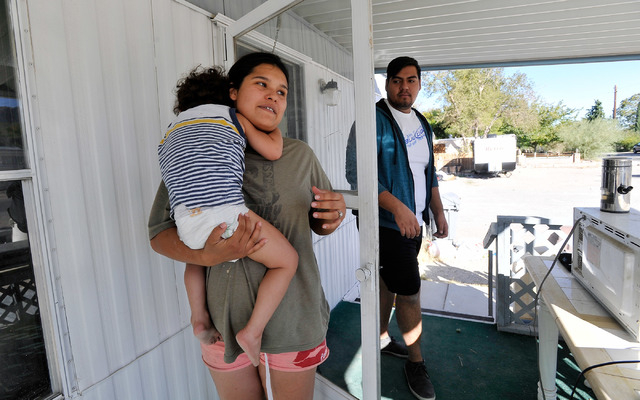
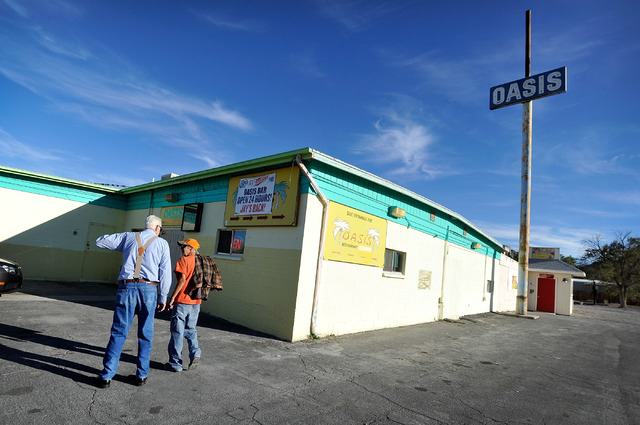
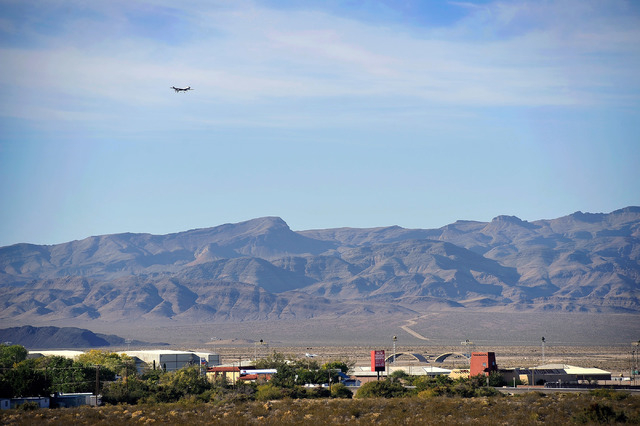
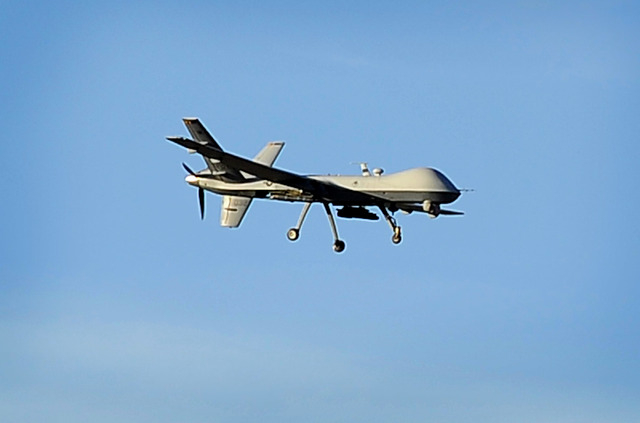
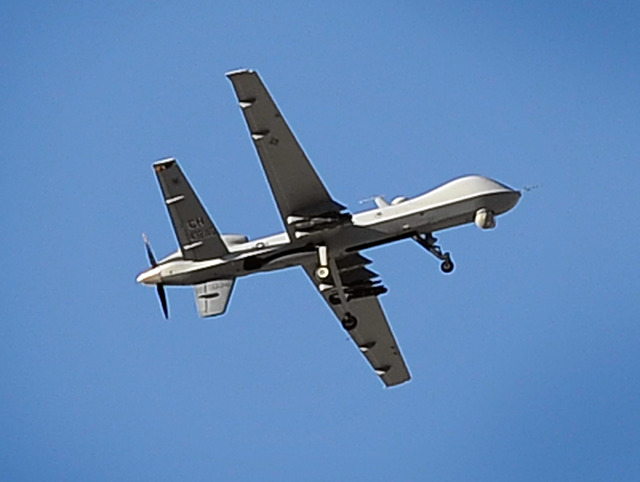
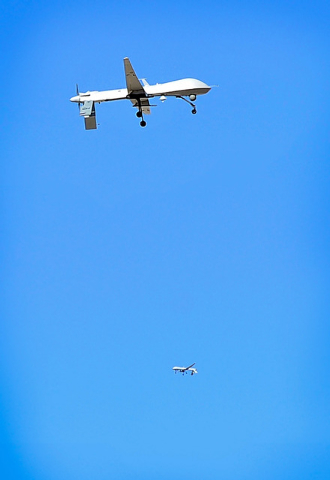

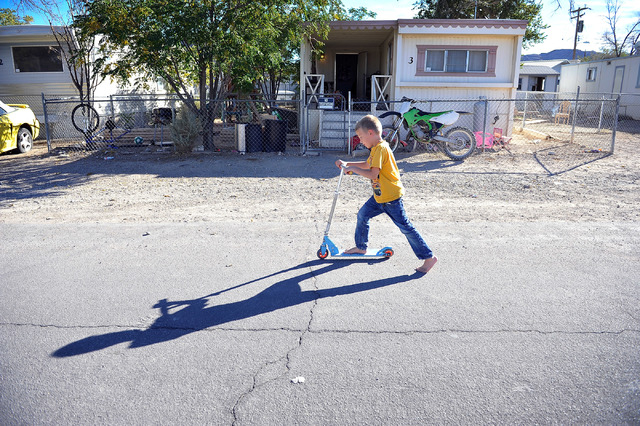
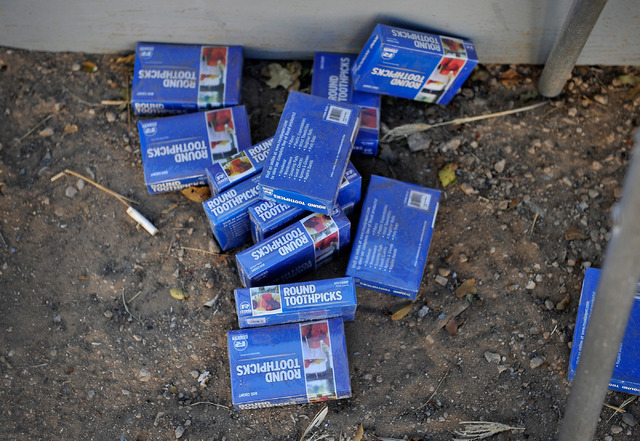
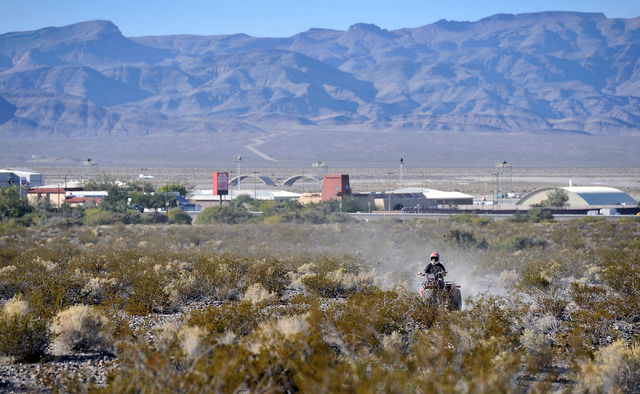
INDIAN SPRINGS — A casino-resort that for 30 years has anchored much of the economy around Creech Air Force Base closed its doors this month to make way for an anti-terrorist security buffer at the airfield where overseas drone combat operations are controlled.
Clark County assessor’s records show the resort property owned by Indian Springs Holdings LLC with its motel, gas station, trailer park and a casino built in the mid-1980s was acquired by the Air Force for $11.45 million. The sale papers, which took effect Oct. 1, were signed by Indian Springs Holdings managers Todd Marshall and Andrew Fonfa, and Deputy Assistant Secretary of the Air Force Mark Correll.
“It was a long process,” Marshall said Wednesday.
Former employees said about 50 out of 60 people lost jobs from the shutdown of the roadside businesses, but Marshall said there was “not anywhere near” that number who were working at the time of the sale.
Although the Air Force owns the property, the gaming license can be retained by the previous owners under a temporary closure until March 31, or until a proposal to transfer it to another location is made, according to Frank Streshley, chief of the Nevada Gaming Control Board’s Tax and License Division.
Marshall said, “We’re working with our lawyer on those entitlements.”
The “long process” that Marshall mentioned involved negotiations that began after the Air Force issued an environmental assessment in 2011 to take over the 16.9-acre rectangle sandwiched between the north side of U.S. Highway 95 and the south boundary of the base, 45 miles northwest of Las Vegas.
Just a few hundred yards north of the base’s block wall, adjacent to where truck drivers often parked their big rigs to rest before continuing their journeys on U.S. 95, pilots and sensor operators sit at computers to control MQ-1 Predator and MQ-9 Reaper drones via satellite links as they fly combat missions over conflict areas thousands of miles away in the Middle East and Afghanistan.
Immediately after the Sept. 11, 2001, terrorist attacks on New York’s World Trade Center and the Pentagon, security forces set up machine-gun nests hidden in camouflaged netting to protect entrance checkpoints at the Creech base.
Although security remained tight, the Air Force allowed limited media access to the base until about 2008. That’s when members of the U.S. and British press were allowed to observe for the first time that U.S. Air Force and Royal Air Force Reaper squadron commanders flew a joint combat mission over Afghanistan.
Since that mission in June 2008, access has been rarely granted to the base. And drone operations, except for routine training flights that can be seen on any given day from the outskirts of the base, have been shrouded in secrecy, especially those tied to CIA activities. Even the last names of personnel are deleted from Air Force news releases and publications as a security precaution.
Capt. Stephani Schafer, a spokeswoman for the 432nd Wing at Creech, said the resort property acquisition was necessary “in order to provide an increased security buffer around the base” to comply with the Defense Department’s anti-terrorism requirement for buffer distances from buildings to boundaries to protect Air Force personnel and assets.
“The approximately $15 million project includes demolition of buildings/structures on the land, fuel tank abatement, land restoration, and construction of a new boundary fence,” she wrote in an email.
The project’s cost includes $11.45 million to purchase the property.
The Air Force’s environmental assessment found there would be no significant impact from acquiring and razing the property. The 226-page report noted, however, that “there would be moderate negative effects to employment and the local economy because the businesses occupying the land would be closed.”
Some of the few dozen resort employees who were laid off by the shutdown said last week they were disappointed. But most, like other residents of the community that stood at 991 during the 2010 census, said they understood why the Air Force needed control of the property.
“I feel bad for the military people,” said Melissa Trotter, 37, who had worked at the resort as a housekeeper, store clerk, waitress and kitchen manager beginning at age 16 about the time it was acquired by the Becker family.
“They don’t like the mess hall. That’s why they came to the casino. They loved the chicken fingers. We made the batter and the dip ourselves,” Trotter said, estimating that lunch often drew 125 to 200 people.
Trotter is one of about 10 workers who landed jobs at a store and gas station across from the resort on the south side of the highway.
She recalled one conversation that an employee had with “one of the higher-ups from Washington” who came to the restaurant on a visit to the base, and who “said he felt unsafe in the barracks because the only thing separating him from the casino and the gas station was a brick wall.”
Jessica Colcord, 31, a laid-off worker who is a single mom with two boys ages 5 and 7, said she will apply for unemployment compensation because the nearest job opportunities are in Las Vegas and she doesn’t have a car.
“I don’t really know what they’re doing over there, but I support our troops,” Colcord said, sitting on the front steps to her trailer-home. “They protect us and they fight for us and they die for us.”
Carol Thompson, a retired former worker at the Nevada Test Site, now the Nevada National Security Site, said, “It’s a shame it happened. I guess the Air Force needed that space more than they did,” referring to the shuttered resort.
“But we still have our little bar here,” she said, standing with her husband, Vernon Thompson, outside the Oasis tavern. “This place here is a wonderful place to live because it’s peaceful and safe.”
Contact Keith Rogers at krogers@reviewjournal.com or 702-383-0308. Find him on Twitter: @KeithRogers2.
Click for a larger view. Below the story, see a map of the land purchased by the Air Force.













